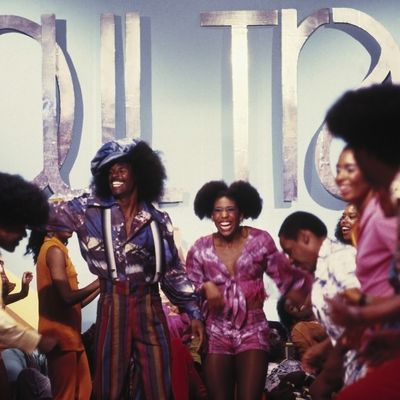
Amongst other things, this weekend’s release of A Haunted House 2 might make you wonder: Why are the Wayans brothers? That’s not an incomplete thought, but a reflection of the existential malaise the barely-were comedians now inspire. Between this movie, its predecessor, a pair of Scary Movies, White Chicks, Dance Flick, and Little Man, Marlon, Shawn, and Keenen Ivory have racked up an embarrassment of embarrassments.
Still, at least one Wayans has produced a good movie. 1988’s I’m Gonna Git You Sucka, written, directed by, and starring Keenen Ivory, is everything their recent efforts are not. While both Scary Movies and both A Haunted House movies look down on the horror genre they send up, I’m Gonna Git You Sucka lovingly sends up tropes used in blaxploitation films like Shaft, Dolemite, and Super Fly. In his film, Keenen Ivory broke the genre down to a main theme: black protagonists’ recurring fears of emasculation. So while I’m Gonna Git You Sucka eventually becomes the type of film it parodies, it’s also a superior satire.
Keenen Ivory plays Jack Spade, an Army vet who comes home after his brother Junebug “OG”s. (He died from wearing too many gold chains.) Jack is outraged: How have the native sons of “Any Ghetto U.S.A.” fallen so far from grace? How did crime boss Mr. Big (John Vernon, Animal House’s Dean, Dirty Harry’s mayor) take over? And whatever happened to square-jawed heroes like John Slade (Hitman star Bernie Casey), Hammer, and Slammer (Isaac Hayes, and Jim Brown)?
Sucka imagines a post-blaxploitation world. John gave up fighting organized crime in Any Ghetto because he got sick of being called a “bad role model.” By contrast, Any Ghetto’s female residents are tougher than the men. In one scene, Ja’net Dubois’s Ma Bell literally transforms into a mustachioed badass, throwing Mr. Big’s goons like they’re nothing. Even a bad guy like Mr. Big isn’t what you expect him to be: When characters in the film seem to recognize him, Vernon reminds viewers that many other respected actors like Angie Dickinson have starred in exploitation films.
Vernon’s fourth wall–breaking protest says a lot about Wayans’s attitude towards formulaic expectations. Stereotypes are comforting because they can be mocked even as they’re used. This is especially true of Keenen Ivory’s female characters. Even well-meaning men like Jack don’t get to use women to make themselves feel better. Ma talks back when Jack begs her to stop fighting his fights. And later, the sex/big-dick-hungry Cherry (Anna-Marie Johnson) turns out to be all fake, from her wig down to her fake leg. Flyguy (Antonio “Huggy Bear” Fargas), a former crime-fighter, is the best example of this kind of instantly deflated machismo. In the past, he was crowned Pimp of the Year for reciting a poem called “Bitch Better Have My Money.” But in the film’s present, bystanders mock his yellow, zebra-striped sombrero and goldfish-filled platform shoes (“Say, brother, you been shopping at the Goodwill?”). Even Kung Fu Joe’s female-voiced car alarm is more intimidating than him: After calmly warning Joe that “Your door is ajar,” the car shrieks, “I said close the door, shithead!”
Everyone gets knocked up a bit. David Alan Grier’s effete newscaster is mocked because he grew up in a rich, white neighborhood. He deserves scorn because he’s completely lost touch with his roots (i.e. doesn’t know how to dance). And while Mr. Big’s white lackeys are also dismissed as impotent stooges — “How come their guns are bigger than ours?” “I dunno, it’s a phallic thing” — a black stooge like Leonard (Damon Wayans) is kicked around twice as hard. Leonard talks in the kind of sub-mongoloid jive that Keenen Ivory and co-writer Robert Townsend previously made fun of in Hollywood Shuffle (1987). He’s repeatedly tossed down the stairs because he doesn’t get why working for Mr. Big is wrong.
On the other hand, Sucka’s heroes aren’t unassailable either. At first, Kalinga (Tales From the Hood’s Clarence Williams III), a toothless Black Panther, looks like the most community-minded hero in the film. But he disappears soon after his white son excitedly reads a school paper on “capitalist swine” Abraham Lincoln. Might doesn’t make right either, like when tough-talking Hammer accidentally shoots himself — repeatedly. Even Jim Brown gets taken down a peg: When Slammer asks Jack why he’s qualified to fight Mr. Big, he replies, “I’m an ex-football player,” just like Brown was in real-life.
By the film’s logic, heroes are only as great as they are comfortably preposterous. Yes, John Slade is shadowed by a swinging backup band (“It’s my theme music. Every good hero should have some.”). But he’s awesome because, not in spite of, that. The only other time Wayans brothers spoofed a preposterous hero was A Low Down Dirty Shame (1994), though that action-comedy isn’t nearly as keen as Sucka is. Treading the thin line between love and mockery, Sucka knows that a movie satire needs a little bit of both. Maybe the Wayans should rewatch it every once in a while.

